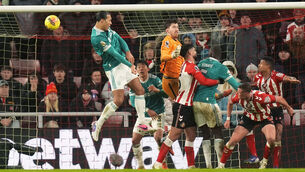Rio ban sparks furious debate
Rio Ferdinand’s eight-month suspension for failing to take a drugs test is either “very draconian” or very light – depending on which expert observer you listen to.
Professional Footballers’ Association chief executive Gordon Taylor was beside himself at the severity of the punishment tonight when he felt Ferdinand could easily have been given the “benefit of the doubt”.














